January 11, 2009
I’m rereading a favorite book in a new form, and watching some old TV shows I’d forgotten were so good, so it’s been a week of favorites for me and I thought I’d share.
I’m also a little desperate for something to blog about, and I must be growing jaded, because my favorites are old, and sadly far too few.
Favorite Books:
J.R.R. Tolkien’s The Hobbit and The Lord of the Rings. I’m currently reading The Annotated Hobbit, an edition annotated by Douglas A. Anderson. I’m loving it, though I think most of the annotations will be something to enjoy on my second reading of this edition. It’s been so long since I read the story, that I find myself just sticking to the story and not reading footnotes (marginal notes in this case). But I did read the introduction, and immersed myself in some fascinating biographical and publishing history. Now and then my gaze veers into the margins and my curiosity is piqued.
I decided to read this story again because I’ve read that Peter Jackson is finally involved in a film adaptation of it, which I’ve looked forward to ever since the LOTR trilogy that he produced and directed. This time I want to view the film adaptation fresh from the written story, rather than from the perspective of more than a decade of fogging over of my memory as I did with the trilogy. Which means I’m reading it now and likely will read it at least once more before the film is released.
I’m also rereading this, and plan to reread LOTR, because the film trilogy has become a mini-obsession of mine and yet every time I watch the movies I keep thinking how much I want to read the books again.
Tolkien is easily my most favorite author, ever. I’d be hard pressed to name a second favorite who comes anywhere close. Maybe it was his relationship to language, as a philologist. He also had a deep, abiding love of the fairy story and ancient poems and songs. (Many of his dwarves’ names are borrowed from the Elder Edda.) I like that he was unapologetic about his errors. He didn’t try to hide them and, if it made sense he fixed them in later editions. If fixing them didn’t make sense, he lived with them without shame or excuse. He was still a teen when he began to create his own language, that of the elves that he used in his stories, incorporated so elegantly into the film version of LOTR a few years ago. Tolkien wrote circles around anyone else, and almost singlehandedly invented the modern fantasy genre. He seems to have recalled something both childlike and ancient, and filled it with something else profoundly basic to humanity, all of which make him seem himself to have been a wizard — of storytelling. Stories are his version of Gandalf’s fireworks, and even of Gandalf’s defeat of the Balrog and death. Tolkien is pretty much at the top of the mountain and well beyond compare, in my opinion. All the rest, even my other favorite authors, are still down there in base camp, wondering about the weather up there on high. Keeping in mind that when climbing the highest mountains in the world, just getting to base camp is something, nothing to sneeze at. Most of my favorite books that even come close to Tolkien’s, though, are older, the authors also long dead.
This makes me wonder if we’re ripe for a literary renaissance. And when I say literary, I mean a STORY renaissance. Preparatory to that, if Tolkien’s work isn’t now required reading in school, I think it should be. I would love to see a new generation fall in love with language and with story.
Favorite TV series:
Star Trek The Next Generation. There’s no comparison, and even viewing old dilapidated recordings of it compares favorably, in fact stunningly so, to most of what I see on TV today.
I was saddened to hear of the death last month of Majel Barrett, and I felt as if her death marked the end of an era (started by her husband, Gene Roddenberry) in science fiction and in television.
While watching old Star Trek TNG episodes, I can’t believe how often I have to reach for tissues because a story line touched me deeply, or I’m still amused by the always tasteful humor some 20 years later, or I’m struck dumb by a profound insight or bit of ageless wisdom. At the same time it’s immensely entertaining, and frequently filled with suspense. There’s nothing like it.
I have a second favorite TV series — actually two sister ones: Stargate SG-1 and Stargate Atlantis. Still, Star Trek the Next Generation is another top of the mountain favorite that is difficult to compare to anything. Who knows, Tolkien himself might even have loved it.
I like The Closer, mainly because the female lead is a character, someone I can relate to. She’s over thirty and still attractive, but it’s not in-your-face plasticized starlet attractiveness. Kyra Sedgwick is beautiful in a way that goes beyond starlet appeal, and you get the impression this is a woman who’s actually honest-to-god aging and struggling to maintain, rather than magically stopping time until the powers that be disappear her from TV as soon as she shows signs of (horrors!) appearing to be over forty. She holds her own in a man’s world without needing to act like a tough chick. She’s spunky and vulnerable, and she doesn’t have to show us the inside of the body as the bullet passes through it for cheap thrills, or make us help examine the vomit under a microscope or eat bugs (honestly, some TV cannot be viewed while enjoying dinner), or be right there for the bloodiest new surgical procedure of the century, spurting arteries and all. I need some mystique left in my mysteries, some characters I can relate to, and not to feel as if I have to learn how not to be squeamish along with the interns in my medical shows. I also wonder why there are so interminably many “realistic” detective and medical shows. Isn’t there anything else to write about, guys? Is the sitcom dead? I guess so.
I like Ghost Whisperer, though I’ve discovered it only recently, so we’ll see how that works out.
I liked Dead Zone, until they killed off Walt the sheriff. I thought he provided an important obstacle between Johnny and his former love, Sarah. Conflict in the form of strong romantic and other obstacles is critical to good series fiction, even a paranormal series that has a new problem to solve each episode. Without the core conflicts and tension to fall back on, a series falls flat because no one seems to be trying very hard, day to day. They’re just biding time until the next psychic flash, murder, ghost, mystery disease, or demon appears. A good series has several backup sources of tension. In Star Trek TNG, nearly every character has a known source of personal conflict that’s always simmering just under the surface, and the series as a whole is full of those tensions sometimes rising, and frequently interacting with others’ conflicts. Killing Walt off, in The Dead Zone, was like letting Marshall Dillon marry Miss Kitty, or letting The Fugitive catch the one-armed man. You just don’t do that, until the very last episode ever. The End.
All that said, I would be hard pressed to come up with new series or episodes from season to season and week to week as the best TV writers do.
Maybe we need a television renaissance as well as a literary one.
Barring that, we may need to let all the Marshall Dillons marry all the Miss Kittys in a big Sun Myung Moon style wedding — and then give TV one big funeral service and be done with it. Most of the shows are so lame, and the commercial breaks are so long these days, that I frequently leave the room to finish the dishes, make a snack, or check my email, and then lose interest and forget to return to see how the show ends. They say there’s nothing new under the sun, and television, as a whole, seems to be trying awfully hard to prove it.
Do you have any new/old favorites to share? What entertains you these days?
— Barbara @ 9:34 pm PST, 01/11/09
March 9, 2008
A few days ago the New York Times ran a story headlined Gang Memoir, Turning Page, Is Pure Fiction, about Margaret Seltzer, alias Margaret B. Jones, and her memoir that wasn’t a memoir at all. She has admitted it was fiction. Today Alternet reports on yet another memoir writer who lied, in Literary Frauds Strike Again … and Again.
So, let’s see if I understand this. We’re supposed to sell our fiction as memoir now? Is that what I’ve been doing wrong? Is this what they mean by creative nonfiction? I’m confused.
I guess the little hand slap mainstream media gave James Frey, not to mention his second book contract, weren’t very good deterrents to the hot new trend in books — memoir fraud.
Readers expect a memoir to be true, if from a limited perspective of the writer’s personal experience and memory of events, which can of course be slightly skewed. We don’t all remember events that happened when we were growing up the same way our siblings or parents remember them. Obviously a lot of other nonfiction is opinion, or facts mingled with theories, presented from a single biased viewpoint. But a memoir isn’t supposed to be deliberately made up and then presented as the author’s own story. That’s called fiction.
These so-called memoir authors sold what they wrote as their own life stories, when they knew the stories either weren’t true or weren’t their experiences. They could’ve called their stories novels, or fictionalized accounts, but they didn’t. They called them memoirs. Some of them (Frey, at least) made a lot of money.
I don’t know about you, but when I spend hard-earned money on a book, my expectations are still pretty high. Those expectations are being fulfilled by books less and less often these days. I’m starting to think it’s no wonder people are reading fewer books, and I think the problem boils down to simple greed.
We all need to make a living. But most of us try to work hard and put in an honest effort at something for our living. We don’t resort to cheating, theft, fraud, and sloppy ethics. So who’s to blame here? Are these people just laughing at all us dummies who bother to actually be honest about our work? Laughing all the way to the bank?
The LA Times has published another opinion on why this type of thing happens in Why we fall for the fakes, an editorial that blames not just the writers, but the publishers, and finally the readers who keep purchasing these books.
What do readers think about this? If you pick up a memoir to read, do you want to know the person is at least attempting to be honest and accurate? Do you want to believe the publisher did their part in making sure they weren’t helping to perpetrate a fraud, or even instigating it? Do you think the writer is making a promise he or she is responsible to keep? Or when you pick up a memoir do you expect a certain amount of fiction?
What do you consider getting your money’s worth from a book? What are your expectations of authors and publishers as far as honesty? Are consumers partly to blame when we keep buying and don’t demand quality and integrity from the companies selling us products? Are we the readers to blame for books that fall below standards in either quality or integrity? Are we voting with our dollar for dishonesty? Or is that just an easy excuse for those who knowingly sell us shoddy or misrepresented products? Isn’t that blaming the victims, something like the purse snatcher saying, “Well she was just walking along the sidewalk. What was she doing there if she didn’t want it stolen?”
Perhaps most important of all, how does this make you feel about telling young people they should read more books?
— Barbara @ 11:40 am PST, 03/09/08
February 15, 2008
It turns out that this Snow on Mt. Palomar, back on December 9, 2007, was nothin’.
But you couldn’t have told me that three days ago, when our high temperature was about 80 degrees Fahrenheit, and I was certain spring had sprung with a summery vengeance. I almost tucked away my warm clothes and pulled out my summer shorts.
There was no more snow on Mt. Palomar. It had all melted since around Feb 5th, when the mountain didn’t boast nearly as much snow as in early December. I did get a nice view of the entire mountain with snow on it, from our polling place on the 5th. But I didn’t have my camera with me, so this view was from our yard. As you can see, it wasn’t as much as in December.
FEB 5

And like I said, by three days ago that was gone, melted. History.
But I’m glad I never got around to putting away my sweaters, because yesterday I don’t think the outside temperature ever rose above 50 degrees, and although the forecast had called for a light drizzle overnight, instead we got dark, threatening skies, cold wind, and steady rain for several hours yesterday.
I was sure that once the clouds parted there would be a fresh layer of snow on the mountains. But when they did, I couldn’t believe what I saw. Here’s our view just as the clouds lifted yesterday afternoon.
CLOUDS LIFTING

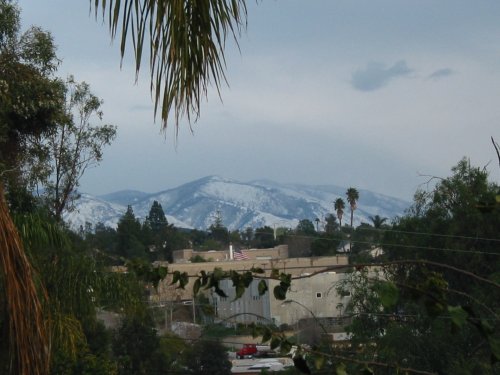
Below shows our view from our side yard at just around sunset yesterday, when the snow reflected the setting sun.
SUNSET
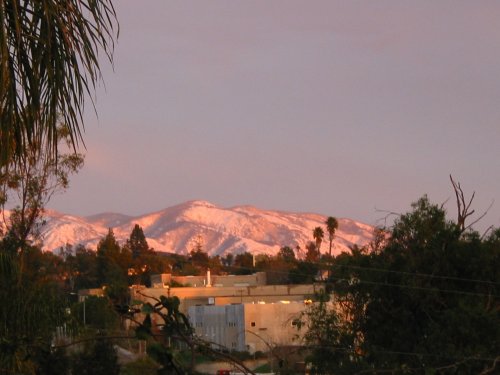
We can only see the lower, southern peak from our side yard, and that’s possible only in the past few months since we removed some obstacles. Below is a view of the entire mountain, from the vacant lot two houses down the hill, this morning. I’ve circled the portion visible from our yard in the second view below.
ENTIRE MT. PALOMAR VIEWED FROM DOWN THE HILL

ENTIRE MTN WITH SOUTH PEAK VISIBLE FROM OUR YARD CIRCLED
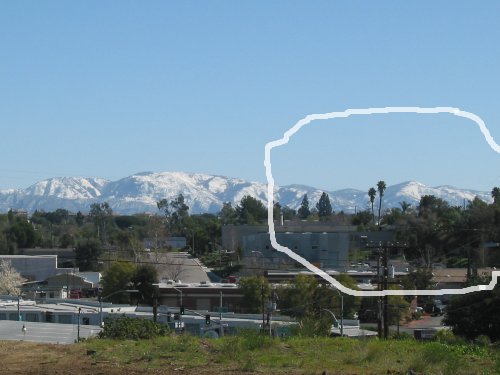
I don’t mind a little warm weather, and I don’t mind a little cold or rain. We can always use more rain around here, and snow is beautiful from a distance, but this snow looks more like Washington, Idaho, or Sierra snow than Southern California snow. Okay, maybe it’s like Big Bear snow. But it’s not normal San Diego County snow. We had roads close near Campo yesterday, which is near the Mexican border! Is it possible the entire region shifted north and we didn’t know it? It’s confusing, and I guess it’s time to dress in layers for a few weeks.
What the news people have to say:
A wintry surprise for area: Snow, sleet, hail, rain turn nice weather upside down
‘Slider’ brings rain around county, snow in moutains.
See what happens around here when it snows? People get stranded, roads close. Just a little snow can set us upside down and sideways. It’s not supposed to snow here.
But it sure looks pretty.
MORE PICS

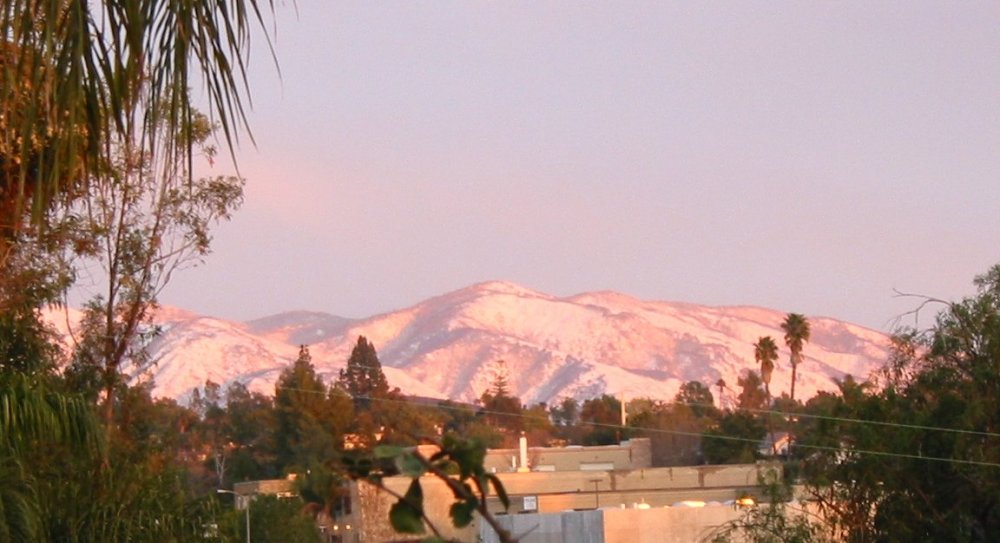
— Barbara @ 12:18 pm PST, 02/15/08
November 30, 2007
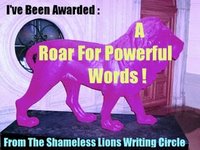
Bev Jackson has awarded me the Shameless Lion Award. This award originated with Seamus Kearney of (more…)
— Barbara @ 1:40 pm PST, 11/30/07
November 22, 2007
We have holidays for a reason, and every culture in the world has had them. But sometimes we need to take a look at our reasons for celebrating, and exactly what it is that matters. We need a way to mark the passage of the seasons, to remind ourselves with lessons from the past why we have reason to celebrate, to review our mistakes as well as our blessings.
When I woke up this morning, I couldn’t stop thinking about this song that I learned as a kid for Thanksgiving: (more…)
— Barbara @ 2:22 pm PST, 11/22/07
July 9, 2007
Gloria Steinem: In Defense of the ‘Chick Flick’:
“I propose, as the opposite of “chick flick,” films called “prick flicks.” Not only will it serve film critics well, but its variants will add to the literary lexicon.” (read article)
Maybe the term “prick” is too strong. It’s not the word I would’ve chosen, yet it answers the fact that a lot of women are put off by the tone and expression, if not the word, used when we hear the term “chick flick.”
Steinem’s editorial reminds me of something that occurred in a “Modern Fantasy” literature class I took, back in the seventies, when Mary Stewart’s first two Merlin and Arthur novels, The Crystal Cave and The Hollow Hills, were recent bestsellers. One of the young men in the class was so taken with them, he asked what other books Mary Stewart had written. I told him she’d written mostly romantic suspense in the past. I had an entire collection of her books at home, older hardcover editions gleaned from thrift store shelves. I thought when he expressed an interest that here was another new fan. But when the young man heard the word “romantic,” he took on a look of utter distaste and lost interest.
Some female mystery novelists still publish today using their first and middle initials rather than their full first names, in order to stretch past that still-existent gender barrier in many male readers’ minds, a practice reminiscent of the Brontës publishing under masculine names. One would’ve hoped that by the time this century rolled around we’d have advanced further. I don’t have statistics on this, but I’ll hazard a guess that there are more women who read and write fiction containing a predominately masculine point of view than there are men who read or write fiction containing a predominately feminine point of view.
Yet I know women, myself included, who enjoy a good action film, of the type once considered a favorite of men. Why is it that women, both in their reading and writing, as well as in movie preferences, might more readily cross old gender barriers?
Mind you, many men do take an equal interest in less violent or less action-oriented movies and books, and I admire men who are open to genres and interests considered historically feminine. I also admire women who open up more to interests previously considered masculine. More women today are sports fans than ever before, and don’t restrict their interests, as I do, to figure skating. My lack of interest is mostly due to bad experiences in physical education classes — I was that awkward, non-athletic kid always picked last for the team. It has nothing to do with my admiration of any outstanding achievement, physical or otherwise, and I enjoy watching good sports-related movies.
What is it that continues to keep some men from enjoying what they term as “chick flicks?” Is it that they truly don’t enjoy more thoughtful, slower-moving, or less action-oriented stories, once they give them a chance? Or is there another reason? Is it adrenaline addiction? (Understandable, among men and women, in today’s world, though perhaps best not encouraged.) Is it fear of what their friends will think? I’m trying not to make assumptions here. I’d really like to know, especially as a female writer trying to sell my fiction.
We all have types of stories we don’t like, or even parts of movies we like that we could do without. I personally back away from anything about child abductions, gangster movies that are overly violent onscreen, comedies that resort to tasteless bathroom humor (bathrooms have doors for a reason), and horror with too much blood and gore added for shock value. As far as I’m concerned, vomit and excrement belong off-screen. There’s enough of them in real life, and they’re not entertaining. They’re certainly not the kind of realism I’m looking for in a story.
I can understand someone not liking romance, even though I usually enjoy it provided it’s not overly sappy. But no one’s personal preference for certain types of stories and not others explains why we need the term “chick flick,” and especially not why it so often seems to be used as a derogatory term. Do the men who don’t like “chick flicks” prefer movies with only men? Is that what it boils down to?
I’m reminded of a line from Frank Herbert’s Dune regarding taking the “waters of life.” It mentions the place in their minds the Bene Gesserit mother superiors (women) fear to go, a place they believe only the fabled Kwisatz Haderach (a man) can access. The Kwisatz Haderach, once he accesses that place, becomes a superior being destined to lead his people to freedom. I wonder about the allegory Herbert intended, if any. Is there a place like that inside the female psyche, where some of the toughest men fear to go? Is that what they fear about “chick flicks?” Will they gain power if they find a way to access that, or will they lose power, possibly even die, as many men did who attempted to become the Kwisatz Haderach? Or will they simply gain a broader understanding of life and the world around them? In that case, maybe it’s worth a shot.
Gloria Steinem makes an interesting observation about power, and about nouns and adjectives in labels:
“Just as there are “novelists” and then “women novelists,” there are “movies” and then “chick flicks.” Whoever is in power takes over the noun — and the norm — while the less powerful get an adjective. Thus, we read about “African American doctors” but not “European American doctors,” “Hispanic leaders” but not “Anglo leaders,” “gay soldiers” but not “heterosexual soldiers,” and so on.” (read article)
— Barbara @ 1:35 pm PST, 07/09/07
July 7, 2007
A post by Susan at Spinning reminded me of a book I recently read, written by the Dalai Lama — The Universe in a Single Atom: The Convergence of Science and Spirituality. The Dalai Lama has nurtured a lifelong interest in science, and this book explores the gaps and meeting places between religion and science, in what I found to be a thoughtful and profound treatise. It was interesting to read how a religious leader views science, which sometimes threatens his long held beliefs and at other times seems to support them. Granted, Buddhism is one of the least dogmatic religions, and Buddhists don’t believe in a personal God or a specific creation myth, as far as I can discern from this and other readings, so he tends to be much more flexible toward science than other religious leaders might be.
I’ve often seen science as exploring the underpinnings, materials, and physical characteristics of the same great work of art (the Universe) that religious leaders and philosophers explore the ideas and impulses behind. Both, at their best, explore the best ways to live within that great work. To me their goals seem to mesh perfectly, so long as greed, dogma, and power plays don’t get in the way. But then I don’t have a set religious belief to try to fit everything into. I think the more set in concrete one’s beliefs are, in either science or spiritual teachings, the more difficult it may be to see the common ground and bridge the gaps. Flexibility is important, and we already know that some of the greatest scientific discoveries are results of either accidents or imagination. Einstein considered imagination more important than knowledge —
“I am enough of an artist to draw freely upon my imagination. Imagination is more important than knowledge. Knowledge is limited. Imagination encircles the world.”
Perhaps the most important way we’re made in any creator’s image is that we’re creative ourselves. It’s that very imaginative nature that can enable us to be flexible and love the mystery of life, rather than try to impose steadfast answers on others.
— Barbara @ 12:32 pm PST, 07/07/07
December 20, 2006
While watching The Ice Storm again for the fourth or fifth time recently, I was struck by how strangely prophetic the movie is when it opens with Tobey Maguire reading a Fantastic Four comic book on a train. Five years later, he starred in Spider-Man. I can’t help wondering if whoever cast him had been watching The Ice Storm and made that comic book superhero connection. It made me think how life is like that. One thing leads to another, and looking back it often seems to fit like pieces of an intricate puzzle into a perfect whole.
These are the kinds of connections that strike me after viewing movies a few times — or reading books more than once. Once I get to know a story, my focus changes and, if the depiction is sound, connections and inner workings start to reveal themselves. I see not only the primary theme, but layers of meaning, sometimes meaning no one ever intended. I like, so far, the fact that I know little about how movies are made. My lack of knowledge lets me keep the illusion alive even while I look deeper.
One of my favorite forms of interaction in movies is between humans and other animals. Horses in particular. This shouldn’t be surprising, considering the connection between horses and people throughout our shared history. But horses in movies seem significant to me because, in spite of the historical relationship, so few of us spend any time with horses today. Including me. I don’t know much about horses except that even though I’ve ridden them only three times in my life (and not very well), I love them, in real life as well as in movies and books. I ate up the Misty of Chincoteague series as a girl, and Airs Above the Ground started my idol worship of Mary Stewart’s books. When I first read The Lord of the Rings, as a teenager, I was almost as upset as Sam when Bill the pony had to be released before entering Moria. I’ve thought that if there is one tiny flaw in Peter Jackson’s movie verions of The Lord of the Rings trilogy it was that Shadowfax didn’t get more attention. He was bigger than life in the books. (But the movie version is so intense and rich that I can’t complain. I can only suggest that anyone who loves the story should also read the books.)
Maybe my fascination with horses is genetic. My mom grew up around horses. Her father traded them, and spent a lot of time at the racetrack. Her maternal grandfather, a Danish immigrant, was a rancher, and a few of her relations were cowboys, either the working kind or, more recently, the rodeo kind. My dad’s grandfather was a blacksmith. So yeah, horses must connect to my DNA somehow. Possibly to everyone’s, considering human history.
There is a special horse in the movie version of The Lord of the Rings, nonetheless. Each time I watch The Two Towers, I have to go back and play a particular scene over again. Perhaps you know it. Aragorn’s horse finds him washed up on a riverbank. The horse nudges him awake, and then kneels to help his injured rider mount. The relationship between horse and man hits me, there, every time. It’s just a movie, right? Well, a little research led me to the fact that Viggo Mortensen spent extra time with that horse during filming and even purchased the horse after finishing the movie. He went on to make his next movie, Hidalgo, with another horse named TJ, again spent lots of time getting close to the horse during filming, and again purchased the horse afterward. Old news for many fans, perhaps, but new and touching for me. I haven’t seen Hidalgo yet, but now I’ll have to.
My favorite movies are the ones with so much intricacy and detail that I can watch them over and over and see something new each time. I’m the same way with books, with poetry, with artwork of all kinds, including architecture. I like the appearance of simplicity, with complexity running deep within. I like infrastructure, lots of background and foundations we never see but sense are there. I like fine craftsmanship in all forms, and the drive to put one’s heart into one’s work. I’ve started to notice this chemistry in movies sometimes, a hint of how a cast and crew must have worked as a team, that remains as a very personal energy running through the finished product. I like to think that even what winds up on the cutting room floor has a part in that energy. That’s how the world is, after all, it’s full of interconnections and even interspecies cooperation, as well as competition, yet deceivingly simple on the surface — for all its obvious glory. The best fiction and the best artwork is, after all, a metaphor for life — at times even something beyond this life.
Which leads me to a final observation from those movies, one that led to an epiphany for me. It came to me the last time I watched The Return of the King. At the very end Frodo turns for a last glance at his friends, and his face transforms from a look of sorrow and grief to a combination of mischief, delight, anticipation, and near beatification — the same expression Galadriel wore when we last saw her a moment earlier. They remind me uncannily of accounts I’ve read of near-death experiences or of messages received from the other side by mediums. Earlier in the story Gandalf even spoke to Pippin about death, referring to it as a passage to a distant country, full of wonder and beauty.
This got me to thinking about why we love fiction, and Joseph Campbell’s perpetual examination of the power of myth.
Too often today fiction is criticized as a form of manipulation, and in many cases rightly so. We see the manipulation in advertising every day, even the most artistic of it. More and more product placement in TV, sensationalized — almost fictionalized — news rather than objective coverage, celebrity worship, so-called reality TV, politicians pumping themselves up or dragging others through the mud, and religious figures taking on exaggerated roles, promising to save us from hellfire of one flavor or another. Even in purer forms of fiction, in the quest to make money, publishers and writers pump out novels faster and faster, according to contracts and marketing ploys, seeking the next book that will be like the one that sold so well before. Stories seem to lose something in the process. They become pure entertainment and cleverly rather than artistically crafted, in a hurry, with little art remaining, little beneath the surface. A tree is cut down for something that remains on bookstore shelves for a couple of months and then is sold used for a penny at Amazon, or forgotten. The reader can begin to feel manipulated or addicted to the illusion and rapid consumption rather than edified by it.
In the midst of all this, why do we still love fiction? Why do we feel driven both to create and consume story? Is it a waste of time? Is it mere child’s play, the pastime of dreamers who need to get a grip on reality? Or is there something much deeper, an innate hunger or instinctive need at work?
If, as some philosophers surmise, and many near-death experiencers and mediums claim, this world is but an illusion, then is all fiction a metaphor for this great stage performance we call life? Plays within the play? Dreams within the dream? Is its purpose to teach us to see the difference between the smaller play and the bigger play, in order to prepare us to see beyond the greater play we act out in this life? (Which might mean Shakespeare’s Hamlet is holy scripture.) Is fiction a tool, an abstract ritual object we use to prepare us to see through that illusion and finally leave this world behind?
I wonder does that make directors, actors, publishers, and fiction writers the priests, handing out the keys to salvation in the form of story? Are theaters and libraries our true temples? Some of us would love to think so, I’m sure. What an ego pump that would be, for a few. What a power trip.
Or is the truth that each human saves himself, perhaps with the cooperation and companionship of his chosen cohorts? Does each of us take in each story and each experience and sift out those of his own choosing and discretion? Does each, in his own way, create his own story, and interpret it as he journeys through life, thus honing his ability to see past the illusion? Does each person make his own way to a deeper truth, progressing step by step toward the blazing dawn of enlightenment?
How does that come about? The best fiction, the best movies, draw us in so completely that if we let ourselves we can believe they’re real at the time we’re in the story. Is that the key to realizing how completely we can be drawn into an illusion, the key that helps us begin to see that it is possible this life, this world that seems so real and has such a hold on us, might possibly also be just a story, only an illusion? Does creating our own illusions show us how it’s done?
That’s my little epiphany, perhaps not meaningful to anyone but me. These things are personal. But I didn’t invent the possibility of the world as an illusion. Plato wrote about it in his Allegory of the Cave some 2,300 years ago, and it’s my understanding there are similar teachings in Hindu scriptures possibly more than 5,000 years old. It’s a thought probably older than that, painted on the walls of caves and leached into the earth from the ashes of ancient campfires, blown on the wind by their smoke, still inhaled each day by us. An ancient thought, as ancient perhaps as myth itself, and human self, which we explore today in the form of movies, plays, short stories and novels, through art, poetry, music — as well as through religion, history, and science. But it’s new for me to think from this perspective, and I don’t think I can ever see the fiction, fantasy, dreams, or creative endeavors I choose to partake in as a waste of time, from here on out. Not that I ever did. Some instinct in me drew me to them, and I answered. Perhaps all I’ve gained from my epiphany is an answer for those who would denigrate such as being a waste of time, of being a symptom of escaping reality or not being practical. It could be that carefully selecting my chosen forms of illusion is a way of taking greater control over my own life rather than escaping it. I can tell the “realists” who call me nothing but a dreamer to . . . watch a movie . . . read a story . . . write a poem. Get real by way of study of the dream within the dream.
Edited 12-21-2006. —BK
— Barbara @ 4:44 pm PST, 12/20/06
November 9, 2006
I used to include the following in my signature when posting on some forums on the Internet:
“I want to start a revolution of kindness.”
I still think kindness is important, though that particular revolution was started at other times by much more qualified people than I. The biggest reason I quit using it as my signature line was, I began to think people looked at those words and thought “bleeding heart liberal” or “easy mark” — or they saw it as just plain cheesy. I became self-conscious about it.
Why? Why do we think of kindness as uncool, naive, or unrealistic? (more…)
— Barbara @ 2:11 pm PST, 11/09/06
April 28, 2006
Or both?
Far be it from me to judge what exactly happened with Kaavya Viswanathan’s novel, How Opal Mehta Got Kissed, Got Wild, and Got a Life. I haven’t read it, and I don’t intend to—wouldn’t intend to even if the publisher hadn’t turned around and pulled it off bookstore shelves. But when I read all the off-shoot accounts of the state of book packaging today, I find myself sympathizing at least a tiny bit, as Rachel Pine seems to, with the young author. Not enough to defend her, perhaps, or to excuse what happened, but honestly—what a confusing business this has become.
I recall an old episode of The Avengers on TV, in which a publisher created a computer to crank out formula novels, then passed them off as having been written by a human being. I thought for sure that was pure fantasy until I began reading about this plagiarism case. Kaavya Viswanathan’s name is on the book’s copyright page, but according to what I’ve read so is Alloy Entertainment’s. So who is to blame? How did this happen? (more…)
— Barbara @ 4:41 pm PST, 04/28/06













